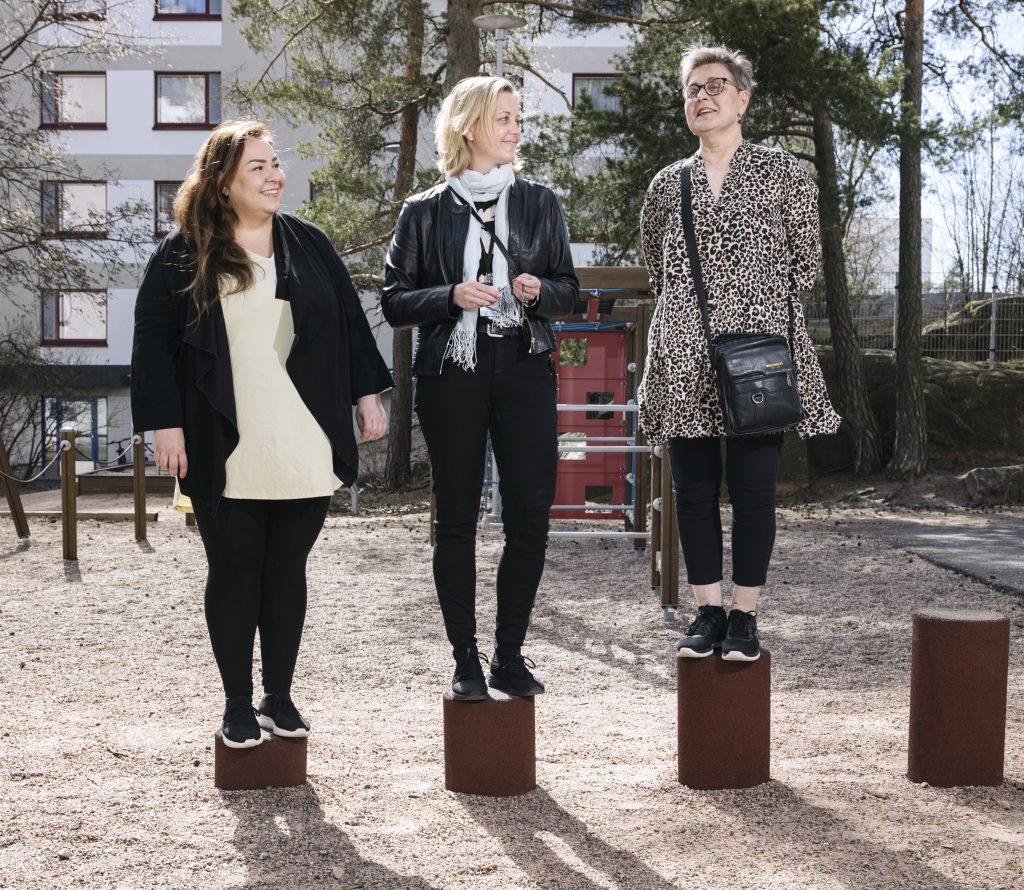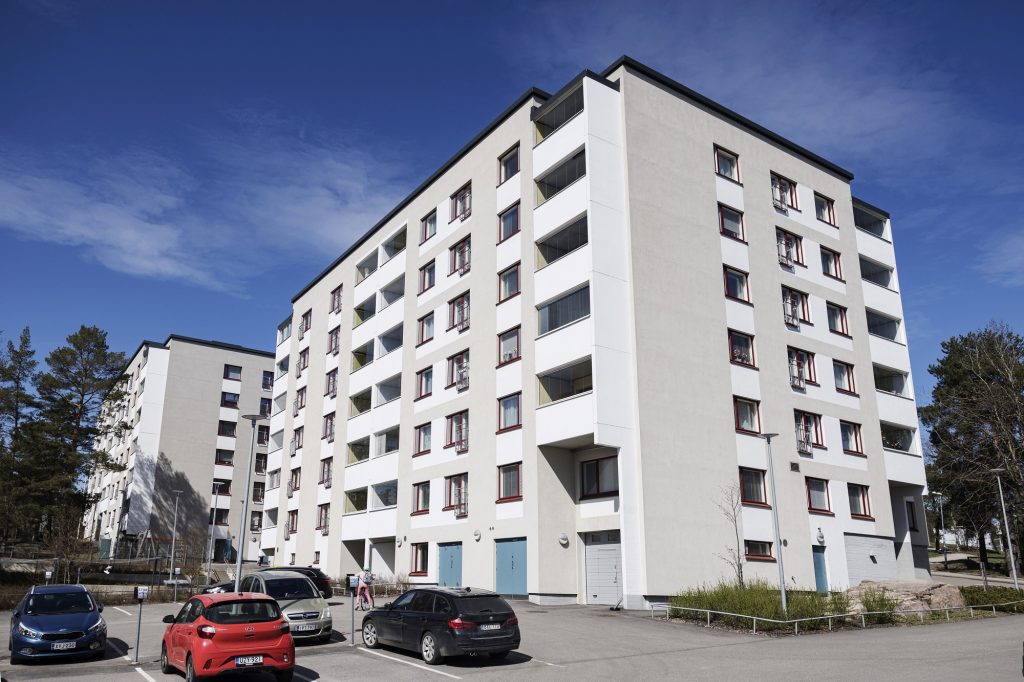Solving problems, managing financial affairs and weeding through legal provisions – property managers know the ins and outs of housing
From the point of view of residents, the work of the property manager often involves resolving issues with housing. In reality, the property manager's job description is extensive.

Property managers Piia Uljas and Sarita Lintelä know the ins and outs of daily life in Heka housing. Uljas, who manages Heka sites in Vallila and Kalasatama, has worked as a property manager for more than ten years and in the property branch for more than 20 years. Lintelä, who works in Pihlajanmäki, started as a property manager last December, and she has five years of experience in the property branch. Both think that the work of a property manager is first and foremost versatile.
“We work with just about everything you can imagine. We are constantly faced with new questions, and it is interesting to start asking our colleagues whether they have ever encountered something similar. And because we have one hundred apartments, we work with at least one hundred residents and one hundred different personalities. Our work is certainly versatile,” Lintelä says.
Seasoned property manager Uljas says that despite having extensive experience, she still encounters new things. The right attitude is an asset in property management.
“Even if you’ve been working for more than ten years, and you think you’ve seen it all, there are still things that can surprise you. You can always learn new things in this work, and it is your attitude that matters. If you’re the right kind of person, you’ll be fine,” Uljas says.

Property managers do not handle defect notifications
A large part of a property manager’s working time is spent answering messages from residents. People usually contact the property manager whenever there is an issue, such as a disturbance, but the work of a property manager is about much more than resolving conflicts. Property managers have multiple skills and knowledge of financial matters and legislation.
“Our work includes all kinds of special situations when it comes to housing, whatever they may be,” Uljas says.
In practice, in addition to intervening in disturbances, a property manager’s tasks include things like the processing of various permit requests, changes in lease agreements (such as transfers of lease and temporary relinquishments), cooperation with active residents, resident committees and neighbouring housing companies as well as budgeting. Property managers also coordinate building safety matters. In renovation and basic improvement sites, property managers are also responsible for providing information and resident guidance during the renovation. However, property managers do not process defect notifications.

Property managers are bound by secrecy
The property manager’s workload varies by site and is not directly linked to the number of apartments. There are differences between buildings: even a small site may mean plenty of work, if the house has a large number of housing disorders or issues between neighbours. Yard maintenance is a general source of contention in terraced houses.
“We are usually contacted when the situation has reached a stalemate, but when we have done our job, the issue is resolved. It makes work meaningful and rewarding. It is not always the case that we issue a warning or that the lease agreement is terminated, but we may refer the residents to mediation or housing counselling, or we act as an intermediary ourselves and try to find solutions that satisfy all parties,” Uljas says.
Property managers are bound by secrecy in respect to many of their duties. That is why the person filing a complaint for disturbances will not be told what the property manager has done to resolve the issue.
“When the person reporting the issue does not hear from us after their report, they may think that nothing has been done. The residents do not always understand that things have actually been done in the background,” Lintelä says.
The best way to contact the property manager is by email and by submitting a service request via the Resident Portal. If you cannot contact the property manager electronically, you can contact Heka’s customer service.
“If you do not know who should handle the issue, contact customer service first. We have good customer service. They know us and the organisation, and they will direct you to property management if your issue falls within the mandate of property management,” Uljas says.

Resident cooperation benefits everyone
Resident cooperation is an important part of the property manager’s work. Property managers keep in contact with resident committees by email and telephone and participate in the meetings of the resident committees and regional committees, if requested. Property managers also process the minutes of meetings, allowing them to learn more about the matters decided at the meetings. Property managers keep up to date with the daily life of the sites through resident committees.
“A good resident committee makes our work easier. The residents know the actual issues on site,” Lintelä says.
Kati Hämäläinen has served as chair of the resident committee of the Heka site at Liusketie 3 for a couple of years. She first took part in resident activities when her children, who have already grown up, were little.
“It was nice because of the children. I was able to make a difference on the committee. Now that the kids have moved out, I thought I would have something to do on the resident committee,” Hämäläinen says.
She welcomes the cooperation between residents and the property manager on Liusketie. After the renovation completed in 2021, a new resident committee was set up with help from the property manager. The committee meets in a comfortable and well-lit club room – which is the result of resident cooperation. Resident committees are involved in deciding on the use of the appropriations for the site, such as whether to decorate the club room. Resident committees may also submit repair proposals to be processed by the property manager.
“It is in the residents’ interests that the site has a resident committee. This will allow for the funds to be made available to residents and used for the benefit of the site and residents. This fosters community spirit, which usually improves living comfort. It would be lovely if we could activate more people,” Lintelä says.

Resident committees have power
The resident committee acts as the residents’ messenger towards the property manager.
“When there’s a problem, we can send a message to the property manager. We try to be a link between residents and the property manager. It is better that things are channelled through one link than having 107 residents contact property management separately,” Hämäläinen says.
Hämäläinen considers resident cooperation to be an important communication channel, which also brings the property manager closer to the everyday life of the property and makes their work easier for the residents to understand. She encourages Heka residents to join the resident committees.
“Many residents have lived in their building for a long time. It would be a great advantage to have them on the resident committee, because they know their site so well,” Hämäläinen says.
Uljas stresses that resident committees can truly influence many things.
“The resident committee represents residents and many decisions of the resident committee can be enforced. Laundry room rules, for example, are a matter for the resident committee to decide,” Uljas says.
“We are people, and the buildings are made for living. Issues are often complex, but when we work together, things are usually resolved one way or another,” Uljas says.